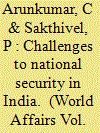|
|
|
Sort Order |
|
|
|
Items / Page
|
|
|
|
|
|
|
| Srl | Item |
| 1 |
ID:
182423


|
|
|
|
|
| Summary/Abstract |
This paper presents a theory of foreign military basing as a function of the degree of internal threat facing a host nation. The theory is based on rational choice logic where politicians balance economic and security benefits against sovereignty and legitimacy costs. When internal threat is low a host nation’s political actors value legitimacy and sovereignty and hence reduce base access. When internal threat is high economic and security benefits trump legitimacy and sovereignty costs, hence increasing base access. The theory is assessed through process-tracing the historical events around U.S military basing in the Philippines. When internal threat was low from coups and revolutionary movements the Philippine government reduced U.S. basing access, but when a threat from these movements was high they either maintained or increased access. This study suggests more carefully considering the role of internal threats when assessing the dynamics of foreign basing.
|
|
|
|
|
|
|
|
|
|
|
|
|
|
|
|
| 2 |
ID:
152428


|
|
|
|
|
| Summary/Abstract |
There are numerous challenges to the national security of India and the extent and scope of threats are complex, varied and vast. C Arunkumar and P Sakthivel argue that if appropriate actions are not taken, the threats may result in the gradual degradation of the Indian state. They suggest a new set of policies and mechanisms in diverse arenas.
|
|
|
|
|
|
|
|
|
|
|
|
|
|
|
|
| 3 |
ID:
129577


|
|
|
|
|
| Publication |
2014.
|
| Summary/Abstract |
Following several months of uncertainty in the wake of the rejection of the treaty establishing a constitution for Europe, the Lisbon Treaty eventually entered into force in December 2009. Although it fell short of establishing a constitution for the European Union (EU), it introduced several noteworthy changes, notably for EU internal security policies, also known as the 'Area of Freedom, Security and Justice' (AFSJ). This special section considers how various dimensions of the AFSJ have been affected by the Lisbon Treaty and the gradual reinforcement of supranational governance that it has generated in this key policy area. Over the past decade, the AFSJ has experienced tremendous development, making it one of the most dynamics areas of European integration. The AFSJ is a broad and heterogeneous policy domain, which includes asylum, immigration and border policies, counter-terrorism, justice and police cooperation, as well as the external dimension of these activities. Given the crucial importance of current internal security threats, such as terrorism, and the sensitivities surrounding policy responses to them, it is necessary to take stock of how far the EU has progressed toward its goals of an AFSJ and how this has been influenced by the most recent treaty changes. To accomplish this goal, this special section brings together some of the most distinguished scholars in the field and several younger scholars conducting cutting-edge research on the AFSJ.
|
|
|
|
|
|
|
|
|
|
|
|
|
|
|
|
|
|
|
|
|